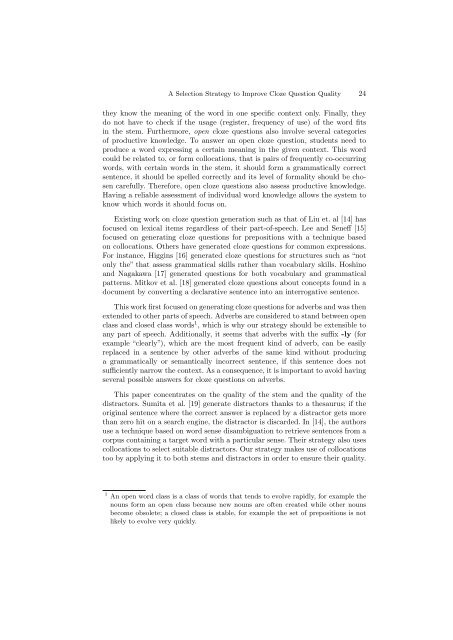Intelligent Tutoring Systems for Ill-Defined Domains - Philippe ...
Intelligent Tutoring Systems for Ill-Defined Domains - Philippe ...
Intelligent Tutoring Systems for Ill-Defined Domains - Philippe ...
You also want an ePaper? Increase the reach of your titles
YUMPU automatically turns print PDFs into web optimized ePapers that Google loves.
A Selection Strategy to Improve Cloze Question Quality 24<br />
they know the meaning of the word in one specific context only. Finally, they<br />
do not have to check if the usage (register, frequency of use) of the word fits<br />
in the stem. Furthermore, open cloze questions also involve several categories<br />
of productive knowledge. To answer an open cloze question, students need to<br />
produce a word expressing a certain meaning in the given context. This word<br />
could be related to, or <strong>for</strong>m collocations, that is pairs of frequently co-occurring<br />
words, with certain words in the stem, it should <strong>for</strong>m a grammatically correct<br />
sentence, it should be spelled correctly and its level of <strong>for</strong>mality should be chosen<br />
carefully. There<strong>for</strong>e, open cloze questions also assess productive knowledge.<br />
Having a reliable assessment of individual word knowledge allows the system to<br />
know which words it should focus on.<br />
Existing work on cloze question generation such as that of Liu et. al [14] has<br />
focused on lexical items regardless of their part-of-speech. Lee and Seneff [15]<br />
focused on generating cloze questions <strong>for</strong> prepositions with a technique based<br />
on collocations. Others have generated cloze questions <strong>for</strong> common expressions.<br />
For instance, Higgins [16] generated cloze questions <strong>for</strong> structures such as “not<br />
only the” that assess grammatical skills rather than vocabulary skills. Hoshino<br />
and Nagakawa [17] generated questions <strong>for</strong> both vocabulary and grammatical<br />
patterns. Mitkov et al. [18] generated cloze questions about concepts found in a<br />
document by converting a declarative sentence into an interrogative sentence.<br />
This work first focused on generating cloze questions <strong>for</strong> adverbs and was then<br />
extended to other parts of speech. Adverbs are considered to stand between open<br />
class and closed class words 1 , which is why our strategy should be extensible to<br />
any part of speech. Additionally, it seems that adverbs with the suffix -ly (<strong>for</strong><br />
example “clearly”), which are the most frequent kind of adverb, can be easily<br />
replaced in a sentence by other adverbs of the same kind without producing<br />
a grammatically or semantically incorrect sentence, if this sentence does not<br />
sufficiently narrow the context. As a consequence, it is important to avoid having<br />
several possible answers <strong>for</strong> cloze questions on adverbs.<br />
This paper concentrates on the quality of the stem and the quality of the<br />
distractors. Sumita et al. [19] generate distractors thanks to a thesaurus; if the<br />
original sentence where the correct answer is replaced by a distractor gets more<br />
than zero hit on a search engine, the distractor is discarded. In [14], the authors<br />
use a technique based on word sense disambiguation to retrieve sentences from a<br />
corpus containing a target word with a particular sense. Their strategy also uses<br />
collocations to select suitable distractors. Our strategy makes use of collocations<br />
too by applying it to both stems and distractors in order to ensure their quality.<br />
1 An open word class is a class of words that tends to evolve rapidly, <strong>for</strong> example the<br />
nouns <strong>for</strong>m an open class because new nouns are often created while other nouns<br />
become obsolete; a closed class is stable, <strong>for</strong> example the set of prepositions is not<br />
likely to evolve very quickly.


